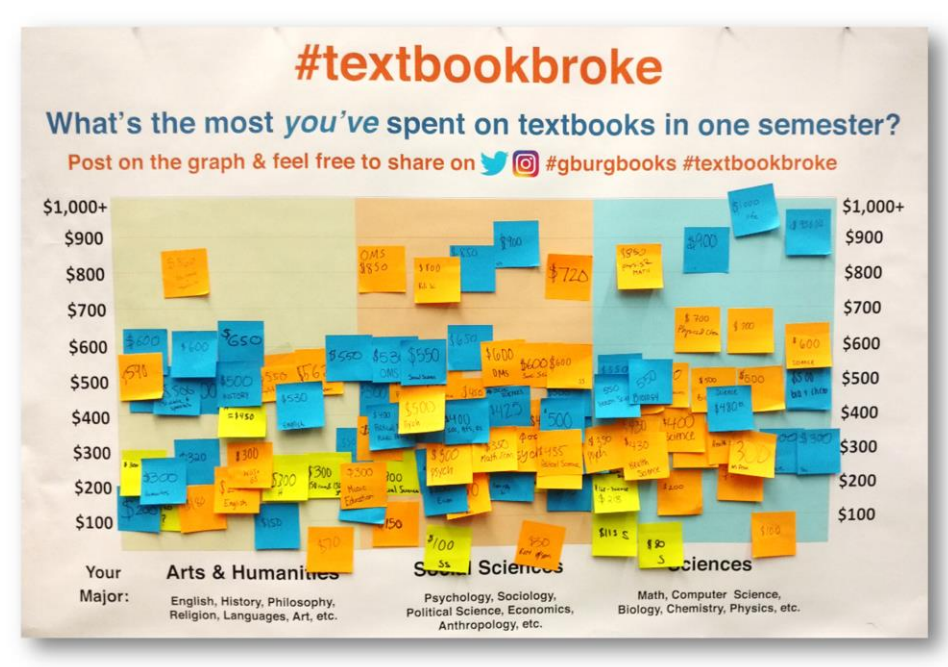You have /5 articles left.
Sign up for a free account or log in.

Staff at the Musselman Library at Gettysburg College in Pennsylvania are encouraging faculty members to use open educational resources to reduce costs for learners.
fotostorm/E+/Getty Images
Affordability in higher education remains a great concern for students, particularly when it comes to required course materials.
Librarians at Gettysburg College in Pennsylvania are broadening efforts to make stakeholders aware of the effects of high textbook prices on students as well as affordable and free options in course material. As a result of their work, 104 course sections at the college in 2023 had zero course material costs, saving students $300,000.
The background: The college first launched affordability efforts in the library in the 2013–14 academic year. Gettysburg belongs to Affordable Learning Pennsylvania, a group of academic libraries and higher education partners throughout the state interested in textbook affordability, and the college joined the Open Education Network in 2018.
Janelle Wertzberger, assistant dean and director of scholarly communications for the library, first learned about open educational resources (OER) in 2014 at a Scholarly Publishing and Academic Resources Coalition (SPARC) meeting, but adoption was slow across the institution until the university joined the network, she says.
Student voices: In 2017, the library conducted an informal student survey on textbook spending by putting up a poster board in the library with a graph. Using sticky notes, students self-reported the most they’ve spent on textbooks in a single term, divided by disciplines—arts and humanities, social sciences, and sciences.

Students at Gettysburg College shared in a 2017 informal library survey how much they've spent on textbook in one semester. The average student shared they'd spent up to $300 but some spent $900 in one term.
Gettysburg College Musselman Library Staff Publications
The average student reported spending between $300 and $500 on books, with some even sharing they have spent upward of $900 on course materials in a single term. Students shared with librarians that if they needed to find a book, they would look online or rent books, but others reported they would “just struggle” or “fake it.”
Gettysburg librarians launched the university’s first official student textbook survey in 2019 to better understand the need for affordable course materials, modeling the Student Textbook and Course Materials Survey developed by Florida Virtual Campus.
Survey Says
Nationally, the average student spent around $285 on course materials in 2022–23, or around $33 per course material, according to data from the National Association of College Stores. Faculty members required 3.9 course materials in 2022–23, on average, which is the lowest number reported since NACS’ Faculty Watch began tracking it in 2016.
But students report a disconnect between course material requirements and affordability.
A 2023 Student Voice survey from Inside Higher Ed and College Pulse found 26 percent of students believe their professors do not take affordability into account when choosing course materials. Around one-third of students say they’ve avoided buying or renting a book for a class, as well.
The survey: The 11-question survey, which had 438 respondents, addressed four research questions:
- How much money do Gettysburg College students spend on textbooks and required course materials?
- What strategies do students use to reduce textbook costs?
- What textbook formats do students prefer?
- How are students affected by textbook costs?
Staff learned students spent an average of $283 on course materials, with the highest at $950 and lowest at zero. Around 10 percent of students spent less than $100 on course materials, with a quarter spending between $101 and $200 and an additional quarter spending between $201 and $300.
Over half (56 percent) of students said their financial aid did not apply to books or materials, and this number jumped to 68 percent among Pell Grant recipients. Of the 8 percent of all students who had materials costs covered by financial aid, 3.2 percent had all their materials covered.
Around one-quarter of survey respondents said the cost of a required book has caused them to not purchase it, and 15 percent said the cost caused them to struggle academically.
As a result of the Florida Virtual Campus and Gettysburg surveys, 11 institutions within the Oberlin Group consortium conducted a student textbook survey in 2022, providing a larger-scale picture of textbook affordability around the nation.
Getting faculty buy-in: In spring 2019, the Gettysburg library launched a book review workshop for faculty members. The workshop, held regularly throughout the academic year, covers training on the benefits of OER, what is covered by open resources and how to utilize materials. Librarians fight the misconception that open resources lead to worse course outcomes for learners, as well.
During the workshop, participants are encouraged to review an open textbook that could support one of their courses, which is then shared to the Open Textbook Library. Faculty members are incentivized to do the review with a $200 award, and the process often results in the professor adopting open textbooks , Wertzberger says.
Partnerships between the library and the Johnson Center for Creative Teaching and Learning also help incentivize faculty members to adopt OER materials.
“Many professors don’t see their course materials choices as their top problem, so it doesn’t get attention,” Wertzberger says. “We need a variety of incentives to continue encouraging a shift."
The two departments offer professional development opportunities to share the impact of textbook prices as well as solutions, including how instructors can incorporate OER into courses or adopt available materials from the library.
A 2021 OER grant offers $500 for faculty members who adopt an open textbook and $1,000 for remixing and adopting an open textbook, Wertzberger says. Among eight grant applicants with a total award of $6,500, 291 students saved $78,025.45, “an impressive return on investment,” she adds.
The impact: In the fall 2023 semester, 1,500 students saved $300,000, bringing the college’s all-time textbook savings to $1.6 million. In 2013–14, fewer than 150 students were enrolled in courses using OER materials, but this fall, more than 1,500 students took classes using OER.
Gettysburg librarians continue to offer campus programming on textbook affordability and OER.
Do you have an academic success tip that might help others encourage student success? Tell us about it.




